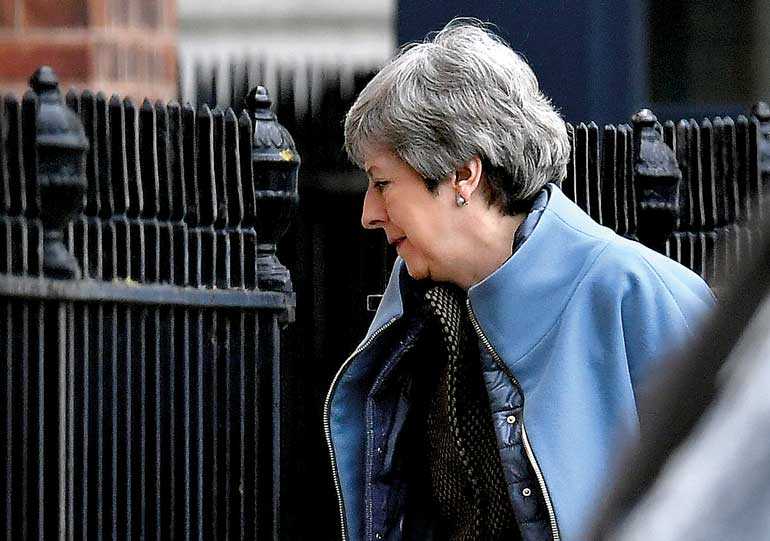Wednesday Feb 18, 2026
Wednesday Feb 18, 2026
Thursday, 21 March 2019 00:00 - - {{hitsCtrl.values.hits}}

Britain's Prime Minister Theresa May is seen at Downing Street, in London, Britain - REUTERS
LONDON (Reuters): Prime Minister Theresa May will ask the European Union to delay Brexit by at least three months after her plan to hold a third vote on her fraught divorce deal was thrown into disarray by a surprise intervention from the speaker of parliament.
Nearly three years after Britain voted narrowly to leave the EU, its departure is uncertain and increasingly impatient European capitals are pressing May to spell out how she plans to resolve the crisis before they can agree to an extension.
Possible eventual outcomes still range from a long postponement, leaving with May’s deal, a disruptive exit without a deal, or even another referendum.
Ten days before the March 29 exit date that May set, and two days before a crucial EU summit, she was on Tuesday writing to European Council President Donald Tusk to ask for a delay, her spokesman said. He did not disclose how long a delay she would seek, but said she believed it should be as short as possible. May had earlier warned parliament that if it did not ratify her deal, she would ask to delay Brexit beyond June 30, a step that Brexit’s advocates fear would endanger the entire divorce.
Other EU member states were discussing two main options: a delay of two to three months, if May persuades them she can clinch a deal at home, or much longer if she accepts that radical reworking of the accord is needed.
The EU’s chief negotiator, Michel Barnier, said an extension would only make sense if it increased the chances of May’s deal being ratified by Britain’s House of Commons.
He said the economic and political costs of a delay for the EU had to be weighed against the potential benefits.
Irish Foreign Minister Simon Coveney said Britain must present a detailed plan on how to push the May’s deal through parliament in order to get EU approval for an extension,
An official in the office of President Emmanuel Macron went further, saying France was ready to veto any British request for a Brexit delay that delays matters without offering a way out of the present deadlock, or imperils European Union institutions.
The BBC’s political editor, Laura Kuenssberg, said May would ask for an extension until June 30 - which could give her another chance to pass her deal - with the option of a delay of up to two years.
Brexit crisis
In a move that added to the sense of crisis in London, speaker John Bercow ruled on Monday that May’s deal had to be substantially different to be voted on again by parliament.
Brexit Secretary Steve Barclay said a vote this week was now less likely, adding: “This is a moment of crisis for our country.” But he indicated the government still planned a third vote.
British lawmakers will in any case be able to debate ways to break the Brexit impasse from Monday, May’s spokesman said.
German Chancellor Angela Merkel warned time was running out, saying: “I will fight until the last minute of the time to March 29 for an orderly exit. We haven’t got a lot of time for that.”
Her foreign minister, Heiko Maas, said: “If more time is needed, it’s always better to do another round than a no-deal Brexit.”
Tusk and Irish Prime Minister Leo Varadkar agreed after talks that they must now “see what proposals emerge from London” before the EU summit on Thursday and Friday.
If Britain left with no deal, it would tumble out of the EU’s 500-million-strong single market and customs union overnight, falling back on World Trade Organisation rules that could mean many import and export tariffs. It would face the prospect of manufacturing and financial market disruptions, sharp economic contraction and border hold-ups.
However, most senior EU figures, while exasperated by Britain’s dithering, have no appetite for pushing it out in 10 days’ time without a deal.
Divisions
The 2016 referendum, which produced a 52-48% vote to leave, exposed deep divisions in British society and has fuelled soul-searching about everything from secession and immigration to capitalism and British identity.
And now Britons’ patience with negotiations may be running out. In a Comres survey in the Telegraph newspaper, nearly half of respondents said Britain would ultimately thrive if it left without a deal.
The pressure to come up with changes means May is likely to get only one more chance to put her deal to a vote.
Bercow said his ruling did not stop the government reshaping its proposal, or having parliament vote to overrule him.
Brexit Secretary Barclay said a change in context might be sufficient to meet Bercow’s test.
But even before Bercow’s intervention, May was having difficulty boosting support for her deal – which would aim to secure close trade and security ties with the EU while leaving its formal structures – after it was defeated by 230 votes on Jan. 15, and by 149 votes on March 12.
She needs to win over at least 75 lawmakers – dozens of rebels in her own Conservative Party, some Labour lawmakers, and the Northern Irish Democratic Unionist Party (DUP), which props up her minority government.
The DUP said it was unlikely to support the deal in a third vote unless it was convinced it can pass, HuffPost reported.
In addition to regulating the terms of departure, May’s deal promises to take Britain out of the EU single market and customs union, common fisheries and farm policies and the jurisdiction of the European Court of Justice at the end of a status-quo period in which new trade arrangements would be agreed.